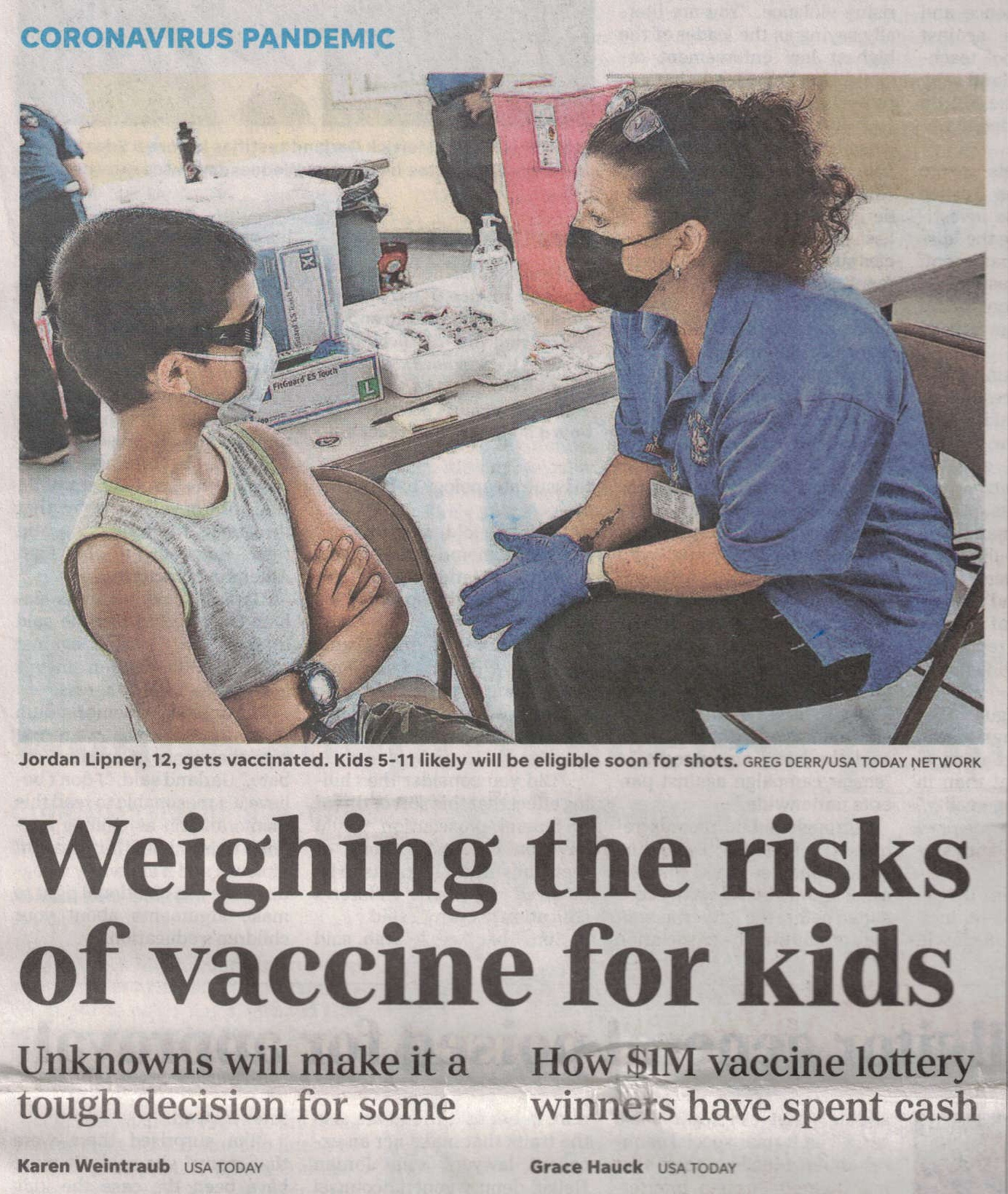ACTION ALERT: USA Today Stokes Parents' Fears of Child Vaccination
Julie Hollar

 USA Today (10/28/21) framed vaccinating children against Covid as a "tough decision" that involved "weighing the risks."
After an FDA advisory panel authorized Pfizer/BioNTech's pediatric dose for kids ages 5–11 in a 17–0 vote (with one abstention), USA Today (10/28/21) responded with the headline, "Weighing the Risks of Vaccines for Kids: Unknowns Will Make It a Tough Decision for Some."
In its online version (10/27/21), the paper phrased it: "Covid Vaccines for Kids Aren't as Clear-Cut as for Adults: Five Factors for Parents to Consider."
The clear message in either case was that parents would need to navigate a high degree of uncertainty about whether they should vaccinate their children.
The problem with that message is that the public health consensus is in fact clear: The risks of vaccination are far lower than the risks of Covid, so children should be vaccinated. (Beyond the FDA's expert panel approval, see, for example, the American Academy of Pediatrics, 8/5/21; Time, 10/30/21; Johns Hopkins, 10/27/21.)
'Factors to consider'
USA Today's Karen Weintraub introduced the article by contrasting adult vaccination, for which "the evidence...is clear," with vaccinating the 5–11 age group, for which "the story...isn't as clear-cut." Vaccination makes an adult six times less likely to contract Covid, Weintraub explained, and 11 times less likely to die from it.
Without offering an immediate contrast with outcomes for children that would explain why the story is less clear-cut, Weintraub went on to note that the FDA advisory panel "concluded the benefits of vaccination outweigh the risks for this age group."
The prospect of CDC approval this week, she wrote, means that
parents are likely soon to be faced with a choice: Would they rather take the small chance of their child falling seriously ill from Covid-19, or the even smaller chance that they will be harmed by the shots intended to protect against it?
USA Today is here "to help with that decision," the article continued, offering a wide array of information about Covid and vaccination in kids, including several points that seemed intended to support the argument against vaccination, like "even without vaccination, it's possible to protect children by wearing masks indoors and vaccinating the adults in their lives," and "every vaccine brings some risks."
Under a subsection titled, "Factors to Consider," the article noted that "a vaccine provides more predictable protection than infection, but an infection may offer broader protection against variants, studies in adults have shown"—as if it's an either/or choice. (To suggest that parents might choose infection with Covid, which has killed 177 children in the US between 5 and 14 years old, as an alternative to vaccination is shockingly irresponsible.)
'Public perception of vaccines'
 Online, USA Today (10/27/21) said that "Covid Vaccines for Kids Aren't as Clear-Cut as for Adults"—but acknowledged 18 paragraphs in that "the risks are theoretical."
Four paragraphs from the end, Weintraub wrote, concerning "a parent's anxiety level": "There are no known serious risks from vaccination and its effectiveness is clear, so a parent who would feel better if their child is vaccinated can easily justify their decision."
In other words, the scientific consensus—that the vaccines are safe and effective—becomes, in USA Today's telling, not the main takeaway and the foundation for parental decision-making, but something that's primarily relevant only to those who are anxious about Covid.
For those less concerned, Weintraub gave the lone abstaining FDA panelist the last word:
While there are clearly high-risk groups in the 5–11 age group for which the vaccine would significantly reduce serious disease, I do not expect protection from infection to last more than a few months, and this may negatively affect public perception of vaccines.
Public perceptions of vaccines are largely shaped by the information they're given about them. Surveys show that up to two-thirds of their parents are reluctant to vaccinate their kids when the shot becomes available. It's a major information gap that credible news media should be working to overcome, not to reinforce.
ACTION:
Please tell USA Today that its reporting on child Covid vaccination should lead with the fact that "there are no known serious risks from vaccination and its effectiveness is clear."
CONTACT:
Michael McCarter
Managing Editor for Standards, Ethics & Inclusion
Email: [email protected]
Twitter: @therealmccarter
Remember that respectful communication is the most effective. Feel free to leave a copy of your message in the comments thread.
|
